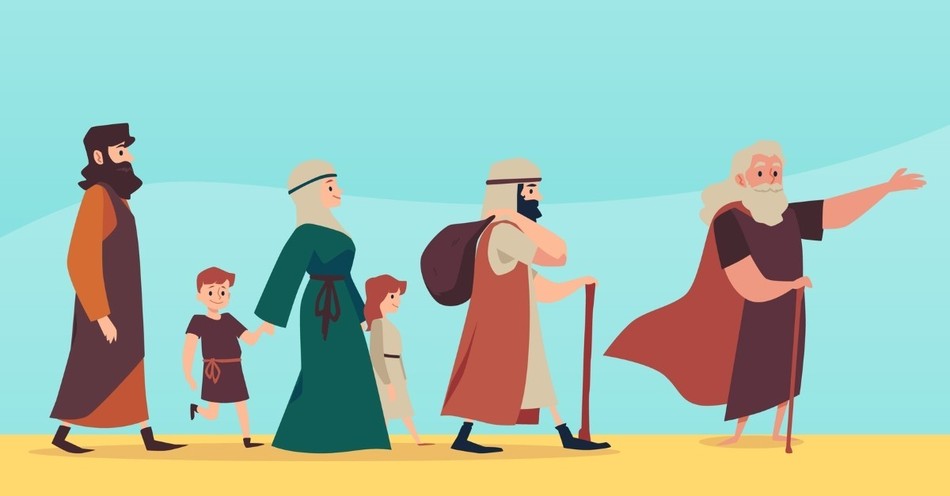Who Was Terah?
Terah. The name is found in the books of Genesis, Joshua, 1 Chronicles, and Luke. Scripture shares limited information about this man, yet he has a pivotal role in his family’s life and history. His physical description is not mentioned in Scripture. He was the leader of his family and was sometimes described as a maker of idols. Were his decisions important in furthering the kingdom of God? Who was Terah, and what role did he have in guiding others?
Where Does the Bible Mention Terah?
Terah is mentioned in the Bible in the book of Genesis. A genealogical list provides background to his family roots. Each person listed in the Bible is a creation of God, making them important. Genesis 11:10-32 shows the lineage from Shem to Abram. According to the Bible, people, including Terah, lived long lives and became parents at older ages. Terah became a father at age 70 to Abram, Nahor (sometimes known as Nahor II), and Haran. Haran was the father of Lot.
Terah is also mentioned in the genealogy of Jesus.. “the son of Jacob, the son of Issac, the son of Abraham, the son of Terah, the son of Nahor” (Luke 3:34 NIV).
What Family Did Terah Come From?
The Bible shares in the book of Genesis about Terah’s family line. Genesis 11:26-32 tells that Terah was a son of Nahor, the son of Serug, who was a descendant of Shem. Terah was born when his father was 29 years of age. Nahor lived 119 years.
Historians share that the father of Serug was Reu. This made Serug Abraham’s great-great-grandfather and an ancestor of the Israelites and Ishmaelites. “And after he became the father of Serug, Reu lived 207 years and had other sons and daughters” (Genesis 11:21 NIV). Each of those sons and daughters held their own important role in life.
Why Did Terah Stop in Haran?
According to Scripture, men moved their families and settled in new lands. Genesis 11 shares people decided to build their own city with bricks instead of stone and tar for mortar. The men wanted to build a tower to reach the heavens.
As the Lord looked down on the people and their city, He decided to scatter them all over the earth. This made the people stop building the city. God was displeased with the prideful people.
Families moved for different reasons. Dusty roads, parched throats, and searching for shelter and food were only some of the difficult travel experiences. Picture the scene with a caravan of wagons, horses, donkeys, men, women, and children of all ages. When a family patriarch chose to move to another area, there may have been disagreements at times. Most people, according to Scripture, followed their family leader even when they would rather have stayed in the same location. Tempers may have flared. Sounds of babies crying may have filled the air. Animals sounding the need for water and food could have been heard throughout the journey. Each day would have been filled with travel. Night may have been the only time to rest while traveling. Guards would have been prepared to keep watch during the night hours and protect against wild animals or other foes.
Terah took Abram, Sarai, and his grandson Lot, and traveled to Canaan. Genesis 11:28 shares that Terah’s son Haran had died. Haran was the father of Lot. Terah then uprooted the family from their home in Ur of the Chaldeans, and the group set out for Canaan. Before reaching their destination, Terah decided his family would settle in the land of Harran. Terah died in Harran at the age of 205.
Scripture doesn’t give exact details as to why Terah and his family made their home in Harran instead of traveling onward to their destination of Canaan. Perhaps grief caused Terah to stop the journey to the land of Canaan. Whatever the reason, God’s plan was in place for Terah to die in Harran.
The Bible shares that God called Terah’s son Abram to continue to Canaan. Scripture states that God promised to make Abram into a great nation. Abram’s name was changed to Abraham, and his wife Sarai’s name was changed to Sarah. Abraham trusted God. Even though Sarah could not have children, God’s promises would be fulfilled in time, and she gave birth to a son. Issac was born to Abraham and Sarah.
Abraham listened to God and trusted Him.
Terah was also known to worship idols. “Joshua said to all the people, ‘This is what the Lord, the God of Israel, says: ‘Long ago your ancestors, including Terah the father of Abraham and Nahor, lived beyond the Euphrates River and worshiped others gods...”’” (Joshua 24:2 NIV).
Some historians believe Terah was worshiping idols to go along with his neighbors. Other historians say Terah was a maker of idols. According to some records, Abraham is said to have destroyed idols that his father had created.
What Can We Learn from Terah Today?
As with every person named in the Bible, we can learn valuable wisdom and lessons from their experiences. Reading Scripture opens the door to learning and absorbing God’s messages for His people. There are extensive details given about some people named in Scripture. Other people are only listed by name, and little is known about their personal life.
Either way, God has given His Word for us to learn from and to grow a deeper relationship with Him.
When reading about Terah, we learn he was a son, father, grandfather, and more. Each of those roles gave him the opportunity to be an example and teach others. Did he make wise decisions? Or were his choices led by selfishness?
Today, we can read about past mistakes and sins by reading Scripture. By reading the Word of God daily, we are reminded of His commandments, His promises, and His love.
Terah, according to historians, worshiped idols. The Bible tells us not to worship idols. We are called to worship God, not things or people.
Terah gathered his family to make a trip to another land. Were there mishaps along the way? Why did he stop before reaching his initial destination? Was he worn out from travel, or did he choose to end the trip for another reason? Only God knows the true answers to those questions.
We can learn from Terah that mistakes will be made. Our aim is to glorify God and learn from our mistakes.
Family was important in Biblical times and is also important today. Sharing the love of Christ can change the world for the better.
God has a plan and purpose for each of His creations
A Prayer for Looking to the Future
Father, thank You for each of Your creations. Thank You for guiding us to learn from the past and look forward to the future. Please give us wisdom, discernment, and revelation so we may share Your love and glory in all words and actions. Help us to stay in conversation with You always. In the name of Your Son Jesus, Amen.
A Prayer for a New Life Journey
Heavenly Father, I’m preparing to start a new journey in life. Feelings of fear and the unknown have caused me to doubt this path. I ask myself if this is what You want for me. Am I listening to You or am I making this decision out of selfish reasons? Am I saying “yes” to this new journey just to please others? Or am I listening to Your will for my life? Father, guide me. Give me wisdom, discernment, and revelation in this new day. I pray for You to give me the words and actions to help others draw closer to You. Please make this new life journey to help me have a closer relationship with You. Help me to put You first, not myself. (Galatians 6:14) In each moment, remind me of Your Holy Presence and love. Remind me that You are in control, not me. Thank You, God. Amen.
(Excerpted from “5 Hopeful Prayers for New Beginnings in Your Life” by Melissa Henderson)
In His Name,
Melissa Henderson
Photo Credit: Getty Images/sabelskaya

Melissa is the author of Licky the Lizard and Grumpy the Gator. Her passions are helping in the community and church. Melissa is an Elder, Deacon, and Stephen Minister.
Follow Melissa on Facebook, Twitter, Pinterest, and at https://www.melissaghenderson.
This article is part of our People of Christianity catalog that features the stories, meaning, and significance of well-known people from the Bible and history. Here are some of the most popular articles for knowing important figures in Christianity:
How Did the Apostle Paul Die?
Who are the Nicolaitans in Revelation?
Who Was Deborah in the Bible?
Who Was Moses in the Bible?
King Solomon's Story in the Bible
Who Was Lot's Wife in the Bible?
Who Was Jezebel in the Bible?
Who Was the Prodigal Son?




